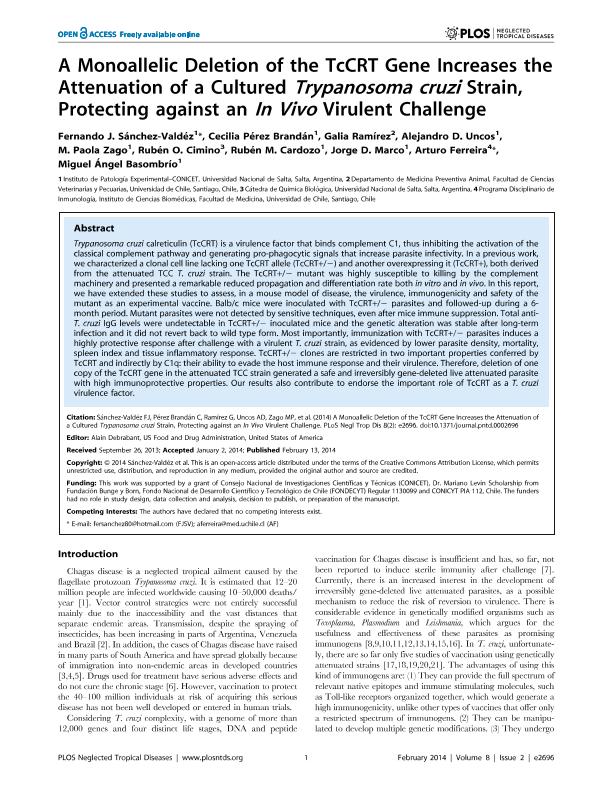Artículo
A Monoallelic Deletion of the TcCRT Gene Increases the Attenuation of a Cultured Trypanosoma cruzi Strain, Protecting Against an in Vivo Virulent Challenge
Sánchez Valdéz, Fernando Javier ; Perez Brandan, Cecilia Maria
; Perez Brandan, Cecilia Maria ; Ramirez, Galia; Uncos, Delfor Alejandro
; Ramirez, Galia; Uncos, Delfor Alejandro ; Zago, María Paola
; Zago, María Paola ; Cimino, Ruben O.; Cardozo, Ruben M.; Marco, Jorge Diego
; Cimino, Ruben O.; Cardozo, Ruben M.; Marco, Jorge Diego ; Ferreira, Arturo; Basombrio, Miguel Angel Manuel
; Ferreira, Arturo; Basombrio, Miguel Angel Manuel
 ; Perez Brandan, Cecilia Maria
; Perez Brandan, Cecilia Maria ; Ramirez, Galia; Uncos, Delfor Alejandro
; Ramirez, Galia; Uncos, Delfor Alejandro ; Zago, María Paola
; Zago, María Paola ; Cimino, Ruben O.; Cardozo, Ruben M.; Marco, Jorge Diego
; Cimino, Ruben O.; Cardozo, Ruben M.; Marco, Jorge Diego ; Ferreira, Arturo; Basombrio, Miguel Angel Manuel
; Ferreira, Arturo; Basombrio, Miguel Angel Manuel
Fecha de publicación:
13/02/2013
Editorial:
Public Library of Science
Revista:
Neglected Tropical Diseases
ISSN:
1935-2735
Idioma:
Inglés
Tipo de recurso:
Artículo publicado
Clasificación temática:
Resumen
Trypanosoma cruzi calreticulin (TcCRT) is a virulence factor that binds complement C1, thus inhibiting the activation of the classical complement pathway and generating pro-phagocytic signals that increase parasite infectivity. In a previous work, we characterized a clonal cell line lacking one TcCRT allele (TcCRT+/-) and another overexpressing it (TcCRT+), both derived from the attenuated TCC T. cruzi strain. The TcCRT+/- mutant was highly susceptible to killing by the complement machinery and presented a remarkable reduced propagation and differentiation rate both in vitro and in vivo. In this report, we have extended these studies to assess, in a mouse model of disease, the virulence, immunogenicity and safety of the mutant as an experimental vaccine. Balb/c mice were inoculated with TcCRT+/- parasites and followed-up during a 6-month period. Mutant parasites were not detected by sensitive techniques, even after mice immune suppression. Total anti-T. cruzi IgG levels were undetectable in TcCRT+/- inoculated mice and the genetic alteration was stable after long-term infection and it did not revert back to wild type form. Most importantly, immunization with TcCRT+/- parasites induces a highly protective response after challenge with a virulent T. cruzi strain, as evidenced by lower parasite density, mortality, spleen index and tissue inflammatory response. TcCRT+/- clones are restricted in two important properties conferred by TcCRT and indirectly by C1q: their ability to evade the host immune response and their virulence. Therefore, deletion of one copy of the TcCRT gene in the attenuated TCC strain generated a safe and irreversibly gene-deleted live attenuated parasite with high immunoprotective properties. Our results also contribute to endorse the important role of TcCRT as a T. cruzi virulence factor.
Palabras clave:
Trypanosoma
,
Virulencia
,
Atenuación
,
Deletion
Archivos asociados
Licencia
Identificadores
Colecciones
Articulos(IPE)
Articulos de INST.DE PATOLOGIA EXPERIMENTAL
Articulos de INST.DE PATOLOGIA EXPERIMENTAL
Citación
Sánchez Valdéz, Fernando Javier; Perez Brandan, Cecilia Maria; Ramirez, Galia; Uncos, Delfor Alejandro; Zago, María Paola; et al.; A Monoallelic Deletion of the TcCRT Gene Increases the Attenuation of a Cultured Trypanosoma cruzi Strain, Protecting Against an in Vivo Virulent Challenge; Public Library of Science; Neglected Tropical Diseases; 8; e269; 13-2-2013; 234-237
Compartir
Altmétricas



